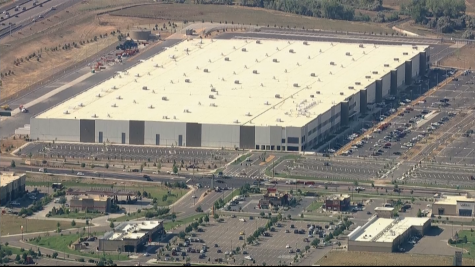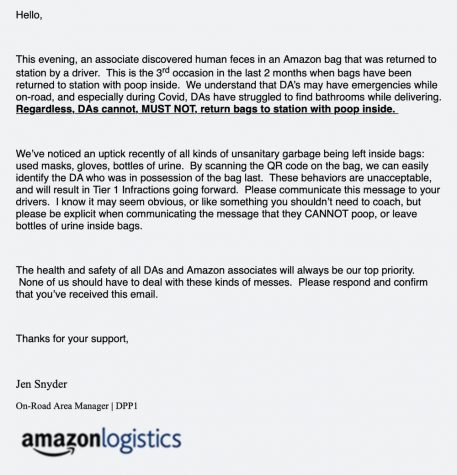Amazon Allegations
Recent unionization efforts have proven the company is far from perfect.

One of several anti-union posters that Amazon placed throughout the Bessemer plant (Credit: The Guardian).
Coming out of a heated battle for unionization at their Bessemer plant, Amazon has had a lot on it’s plate recently: public scrutiny over a myriad of things, a Twitter debacle involving U.S. Senators, unionization efforts continuing to persevere even after a loss and the list goes on. But in the midst of all this has been time for self-reflection on every level of the company. And one message seems to be constantly recurring: something needs to change.

(Credit: CBS).
In his final letter to shareholders as CEO, Jeff Bezos said, “Does your Chair take comfort in the outcome of the recent union vote in Bessemer? No, he doesn’t. I think we need to do a better job for our employees.” Even the company’s founder acknowledges that there is a need for change, and the best place to start is working conditions.
Complaints regarding working conditions in Amazon warehouses are nothing new. Dating as far back as 2013, workers have consistently said they were overworked, undercompensated, and incredibly fatigued. Hasan Topuz, a member of the Eaglecrest community, worked at an Amazon Fulfillment Center in Thornton. In the seven months he was there, Hasan says, “I was always so tired…working ten-hour shifts with like no break.”
And perhaps the most damaging allegation of them all: workers have repeatedly been accused of urinating or defecating in bottles, due to overworking. Claims of this first originated in 2018 and haven’t let up since. And while Amazon still claims these are nothing but allegations, recent documents have shown otherwise. In a document obtained by The Intercept, it was revealed that not only did Amazon report an incident of this, but it was nothing new to them. Hasan says that while he never saw this personally, “I believe it…a lot of the time there’s no room for a bathroom break.”

Abhorrent working conditions are one of many reasons that workers began to push for a union. In Bessemer, Alabama, the largest unionization effort in company history took place this year, with over 6,000 workers voting. For context, the last union vote at Amazon was in 2014 and had only 30 employees voting.
While the Bessemer workers voted in favor of no union, the vote still scared Amazon. Big names like Sen. Bernie Sanders, Mark Pocan and musician Tom Morello were all campaigning for union forces. And the consequences of a pro-union vote would be drastic for the company, likely causing union voices to pop up in plants and warehouses all across the world.
However, in the end, employees did vote overwhelmingly to not unionize. And as such, one would think this was over. However, it’s very much not. Union organizers maintain that the efficacy of the voting process was tainted by Amazon, and that unfair voting practices were put in place by Amazon. A hearing at the Labor Board will begin May 7 to further investigate these allegations.
Specifically, the Retail, Wholesale and Department Store Union alleges that Amazon threatened, “retaliating against pro-union employees and…widespread layoffs and closing the facility if employees voted for the union.” They cite an email that was allegedly sent to employees, the contents of which said 75% of workers could be laid off if union forces win.
And this investigation is not just the union forces being sore losers, these allegations have foundation. Even in the beginning, many questioned Amazon’s handling of the vote, such as when they requested the vote only be held in-person. Additionally, the Labor Board just recently released a statement saying these objections could contribute to overturning the vote.
Regardless of whether the election is overturned or not, Amazon’s repeated policy of overworking employees and union busting needs to change. These policies have affected communities across the country including ours, where a warehouse is not even 30 minutes away.

Demir Mikulin is a sophomore here at Eaglecrest and this is his first year on staff! He prefers the written content side of advanced media, and loves to...





